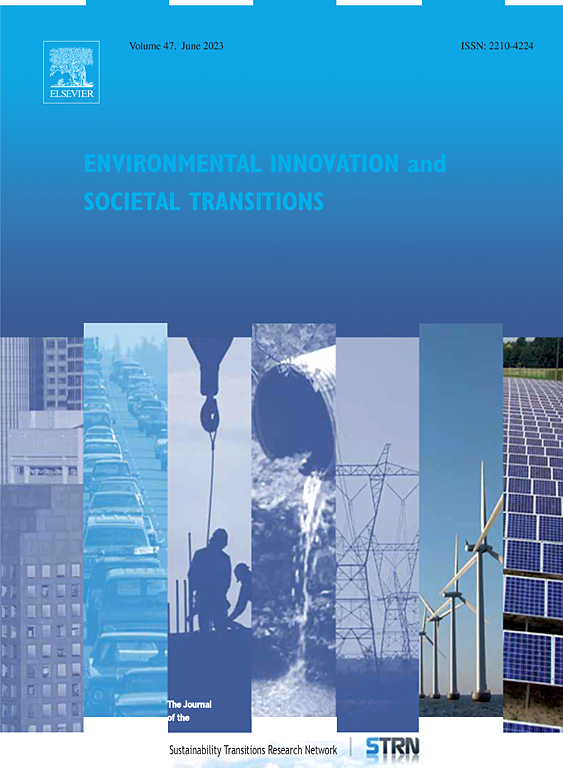配置杠杆点,有意加速欧盟食品系统的理想型转型途径
IF 6.1
2区 经济学
Q1 ENVIRONMENTAL SCIENCES
Environmental Innovation and Societal Transitions
Pub Date : 2025-09-05
DOI:10.1016/j.eist.2025.101041
引用次数: 0
摘要
欧盟食品系统的复杂性对向可持续和健康食品消费的过渡提出了重大挑战,因为相互依存的因素再现了抵制变化的稳定社会结构。杠杆点(lp)的概念有助于确定刺激系统变革的战略干预点。然而,专注于个别有限合伙人往往需要在变革的可行性和深度之间进行权衡。此外,现有的LP方法往往忽略了相互关联的社会结构的长期共同进化。为了解决这一差距,我们将LP类别与加速进展的机制联系起来,这些机制沿着四条过渡途径预测潜在的未来动态。我们将这一综合框架应用于专家焦点小组数据,展示了特定LP配置如何有意加速系统转换。以创新为切入点,我们确定了支持这些创新在整个系统中升级和传播的LP配置。我们的研究结果表明,混合深层和浅层LPs可能有助于克服系统惯性。尽管如此,为了充分应对欧盟食品系统中可持续性和健康挑战的规模和紧迫性,可能需要跨不同子系统的多种共存的过渡途径。本文章由计算机程序翻译,如有差异,请以英文原文为准。
Configurations of leverage points for the deliberate acceleration of ideal-type transition pathways in the EU food system
The complexity of the EU food system poses a significant challenge to the transition towards sustainable and healthy food consumption, as interdependent factors reproduce stable social structures that resist change. The concept of leverage points (LPs) helps identify strategic intervention points to stimulate system change. However, focusing on individual LPs often entails trade-offs between transformative feasibility and depth. Moreover, existing LP approaches tend to overlook the long-term co-evolution of interrelated social structures. To address this gap, we connect LP categories to mechanisms that accelerate progress along four transition pathways that predict potential future dynamics. We apply this synthesized framework to expert focus group data, demonstrating how specific LP configurations can deliberately accelerate system transitions. Taking innovations as entry points, we identify LP configurations that support the upscaling and spreading of these innovations throughout the system. Our findings suggest that blending deep and shallow LPs may help to overcome system inertia. Nonetheless, multiple, co-existing transition pathways across diverse subsystems may be required to fully confront the scale and urgency of sustainability and health challenges in the EU food system.
求助全文
通过发布文献求助,成功后即可免费获取论文全文。
去求助
来源期刊

Environmental Innovation and Societal Transitions
Energy-Renewable Energy, Sustainability and the Environment
CiteScore
13.60
自引率
19.40%
发文量
90
审稿时长
56 days
期刊介绍:
Environmental Innovation and Societal Transitions serves as a platform for reporting studies on innovations and socio-economic transitions aimed at fostering an environmentally sustainable economy, thereby addressing structural resource scarcity and environmental challenges, particularly those associated with fossil energy use and climate change. The journal focuses on various forms of innovation, including technological, organizational, economic, institutional, and political, as well as economy-wide and sectoral changes in areas such as energy, transport, agriculture, and water management. It endeavors to tackle complex questions concerning social, economic, behavioral-psychological, and political barriers and opportunities, along with their intricate interactions. With a multidisciplinary approach and methodological openness, the journal welcomes contributions from a wide array of disciplines within the social, environmental, and innovation sciences.
 求助内容:
求助内容: 应助结果提醒方式:
应助结果提醒方式:


